Hail, Caesar! part 7
Eddie heads back to the Chinese restaurant to meet, for a second time, with Cuddahy, the man from Lockheed. What has changed in Eddie’s life in the past six hours? He’s had to deal with a director throwing a hissy fit, he’s had to pay ransom for a kidnapped movie star, figure out a solution to a pregnant mermaid problem, fend off fights from two gossip columnists, and save the life of an editor who was almost killed by her own Moviola. That has involved a lot of running around but nothing that Eddie would call “physical culture.” Cuddahy offers Eddie a contract of ten years, with stock options. He’s essentially offering Eddie a chance to be “set for life,” a sense of permanence in a world full of craziness. He also offers Eddie a set of airplane gifts for his children — he knows that Eddie’s 27-hour days leave him no time to be a husband and father, and that wracks him with guilt.
As Hobie Doyle’s Act III begins, evening is closing in and Hobie finds himself, an awkward Romeo, waiting beneath the balcony of his blind date Carlotta Valdez. Given nothing to do for a moment, Hobie amuses himself with some expert rope tricks. Physicality is in his blood. Carlotta, when she appears, demonstrates how she “keeps the bananas on her head” when she dances by demonstrating for Hobie. They are, in this way at least, perfectly matched — entertainers of physical charm, caught at a moment of film history that emphasized physical charm over, for instance, editing, or lighting, or camera placement. The Technicolor that brought people into theaters was murder to light, so everything had to be super bright, and the cameras were absurdly large and cumbersome, so movies remained, at Capitol anyway, hopelessly stagebound. That would all change in a few years with smaller, lighter cameras and an emphasis of human interaction instead of physical charm, and a new generation of directors would emphasize editing and “realism” over performance and artifice, but, as I say, for the purposes of Hail, Caesar!, everyone is quite satisfied with the status quo.
Eddie goes home to give his sleeping children their presents from Cuddahy, and sits down to his wife’s home-cooked meal. No nightclubs or premieres for Eddie Mannix; he is, for all intents and purposes, a working man. His one guilty-father dilemma, that he forgot to call his son’s little-league coach, “worked itself out,” and his son is perfectly happy without his interference. In a very quiet way, Eddie’s dinner scene presents him at a crossroad, where he’s presented with the possibility of letting go of control, where he might be able to relax and stop having to face one crisis after another all day. If Cuddahy offered Eddie cigarettes, gifts and the hydrogen bomb, his quiet meal with his wife offers the other side of Cuddahy’s offer: sanity, stability and middle-class comfort.
At their luxurious oceanside hideout, the communist screenwriters bide their time while waiting for their ransom money. They sleep, play cards and, most tellingly, finish a jigsaw puzzle, the last piece of which doesn’t fit. The lead communist fills out a Communist Party Membership Card, which, for students of the era, is an important visual note: when, in a few years, McCarthy goes hunting for communists in Hollywood, “card-carrying members” will become his signature catchphrase.
Baird Whitlock, meanwhile, has enthusiastically become a student of the cause. Because he’s an idiot, he thinks that a long, pointless story about shaving Danny Kaye’s back is a perfect illustration of the dialectic. 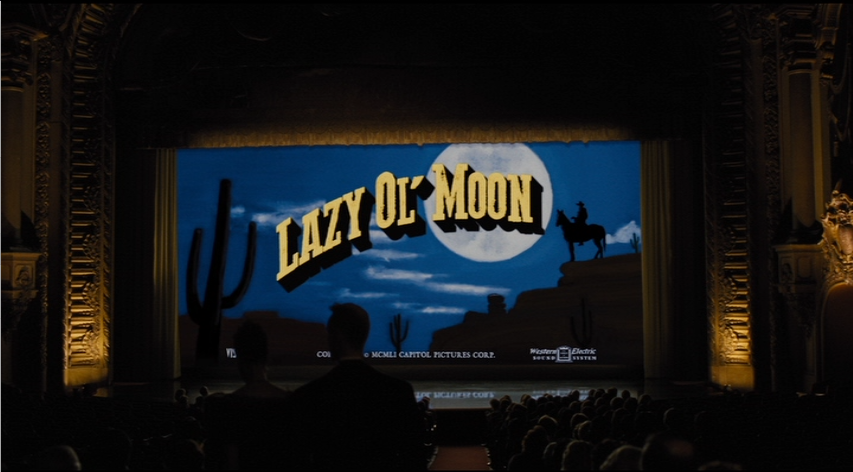
Hobie takes Carlotta to the premiere of his new Capitol movie Lazy Ol’ Moon. Lazy Ol’ Moon is what the Coen Bros would call a “hick comedy,” which is how they characterized O Brother Where Art Thou. The gold standard of hick comedies were the Ma-n-Pa Kettle pictures, entertainments for “the masses,” cornball comedies that were enormously popular and saved Universal Pictures from bankruptcy. A kind of white minstrelry, hick comedies were made by huge studios and designed to appeal to a rural audience’s sense of self. The idea of one premiering in Hollywood in a lush, ornate theater is a visual gag in and of itself — the audience of Lazy Ol’ Moon would feel quite out of place with the tuxes and gowns of 1950s Hollywood. Nevertheless, the charm of Hobie’s singing voice — for he can also sing like Hank Williams — and the slapstick of the hick comedy of Lazy Ol’ Moon gets a huge reaction from the premiere audience. And not an ironic, cruel reaction either; the sophisticated crowd is genuinely charmed and amused by the simple pleasures of the picture.
While Hobie and Carlotta watch Hobie’s movie, Eddie heads across town to meet with DeeAnna Moran and Sid Siegelstein from business affairs (ahem). They have all come to the office of Joe Silverman, who seems to be a fixer’s fixer, a man who can make anything disappear, or appear, legally, with just pen, paper and rubber stamp. DeeAnna only wants to know “And he’s reliable?” “Reliability,” the viewer may dimly recall from an hour earlier in the picture, is a quality DeeAnna has been yet unable to find in a mate. Sid informs DeeAnna that Silverman is “the most reliable human being on the planet, in our experience.” This, we will learn, seals the deal for DeeAnna; regardless of Silverman’s physical characteristics, and the fact that he apparently lives in a seedy, dark office packed with papers and stamps, DeeAnna sees what she needs in him. Again, I don’t think the narrative supports much of a Jesus metaphor for DeeAnna’s unfathered baby, but the fact that she runs off to Palm Desert to marry a Jew named Joseph (again, don’t forget, palms were only brought to California in an effort to make it a kind of New World Holy Land) must mean something.
To make the Jesus connection clearer, the Coens cut to Eddie screening (with his hard-working secretary Natalie) the dailies from Hail, Caesar! ATOTC, where we see Baird Whitlock’s Autolocus Antoninus meet Jesus face-to-face. We see take after take of Whitlock’s face as he struggles to come up with an expression that indicates “perceiving the divine.” In this moment, Whitlock is the physical expression of Eddie’s impulse: he wants to get across to the masses the importance of the divine while he struggles to find the right expression, while he tries to winnow through the many holy and broken hallelujahs at his disposal. (“Squint! Squint against the grandeur!” commands the off-screen director at Whitlock as he comes up short.)
Meanwhile, Hobie charms Carlotta by doing rope tricks with his spaghetti at dinner. Hobie, it seems, can do anything — ride a horse, rope a steer, sing a song, play a guitar, put on a tux, charm a sophisticate, and now entertain a fellow movie star. He tells Carlotta his story in the most unassuming terms possible; as far as he can tell, he’s just been moseying through life, and Capitol Pictures has, for reasons unknown to him, decided to make him a movie star. Everything comes naturally to Hobie, and everything is taken in stride. He enjoys what he does, he’s grateful to “capital,” he knows, perhaps, that it could all end tomorrow.
(It did, of course — I can’t, for the life of me, remember even the title of a 1950s “singing cowboy” picture. Roy Rogers and Gene Autry were much earlier, and singing cowboys vanished from the screen entirely by 1954. Hobie seems more like a presage of Elvis Presley, another “natural” talent who charmed movie audiences with his magnetism and physical beauty.)
Hobie looks about ready to seal the deal with Carlotta when he spies Eddie’s briefcase — with Hobie’s own belt still wrapped around it — in the possession of none other than Burt Gurney, the dancing star. Before he can register what that means, his date with Carlotta is interrupted — and spoiled — by both Thora and Thessaly Thacker, who fight over the “story” of Hobie’s and Carlotta’s “friendship” and thus kill any possibility of real friendship. In this way, Eddie the storyteller has told a story — Hobie and Carlotta are dating — that has come close to coming true, if not for the interference of the press, who have their own axes to grind. But that becomes beside the point as real life invades Hobie’s sense of right and wrong and Hobie takes off after Burt Gurney.
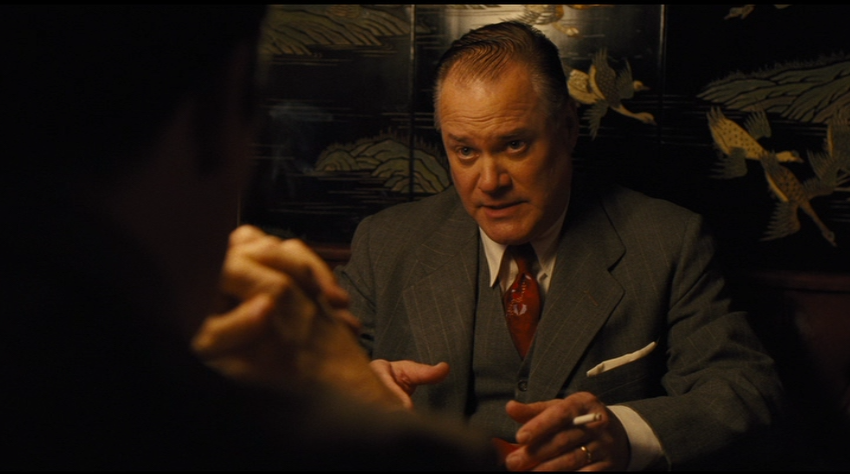
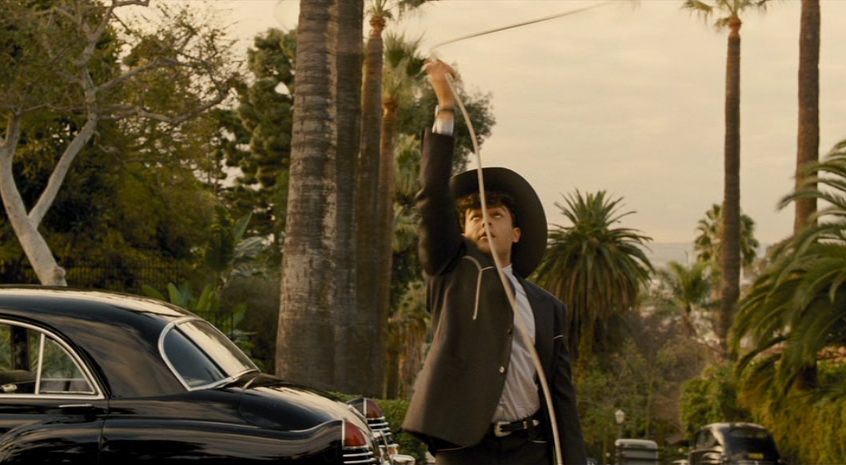
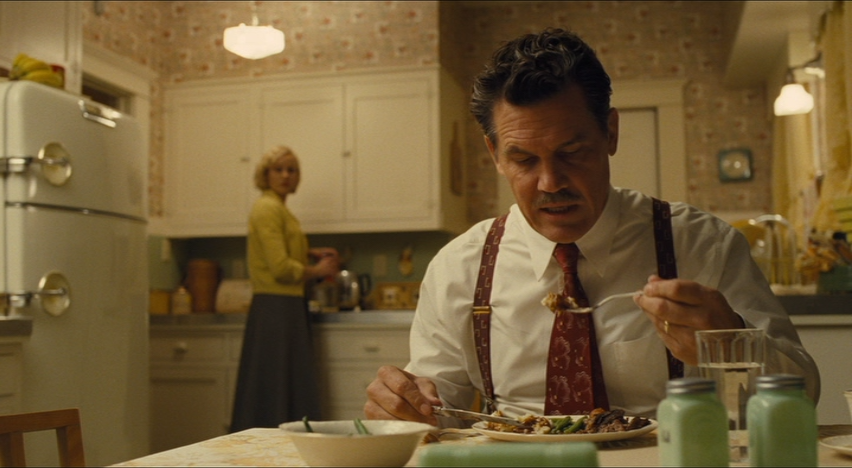
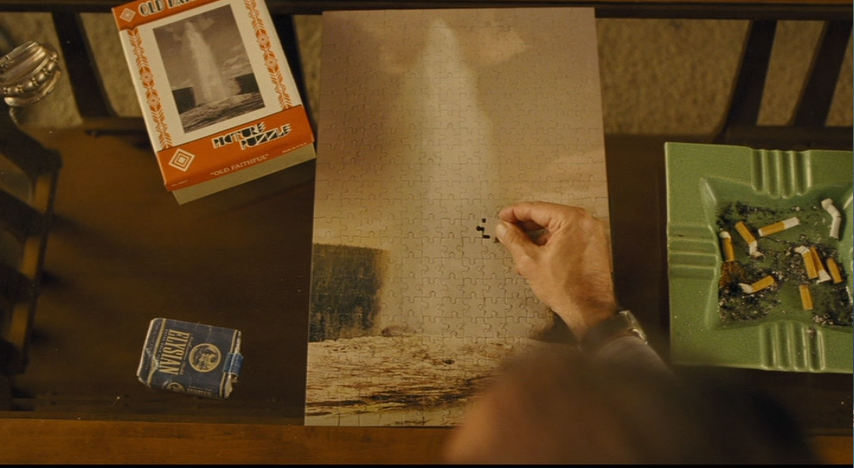
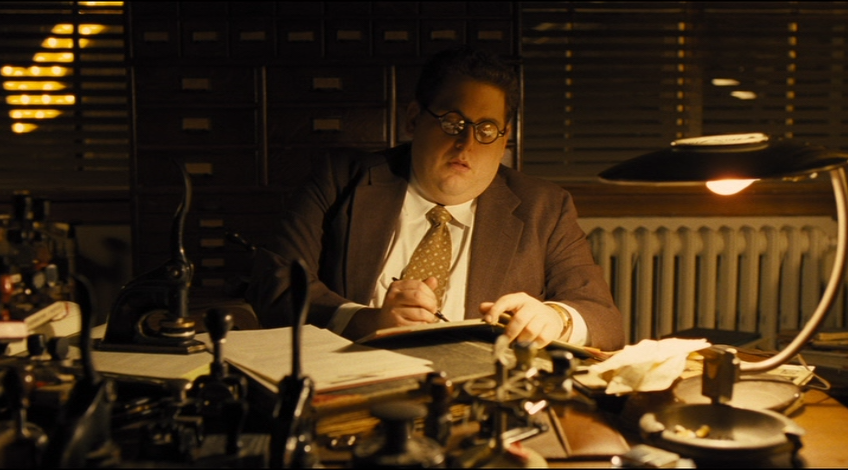
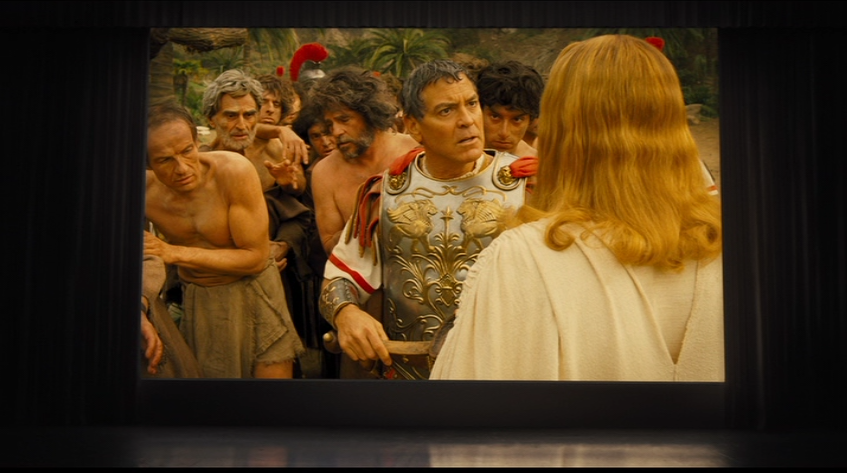
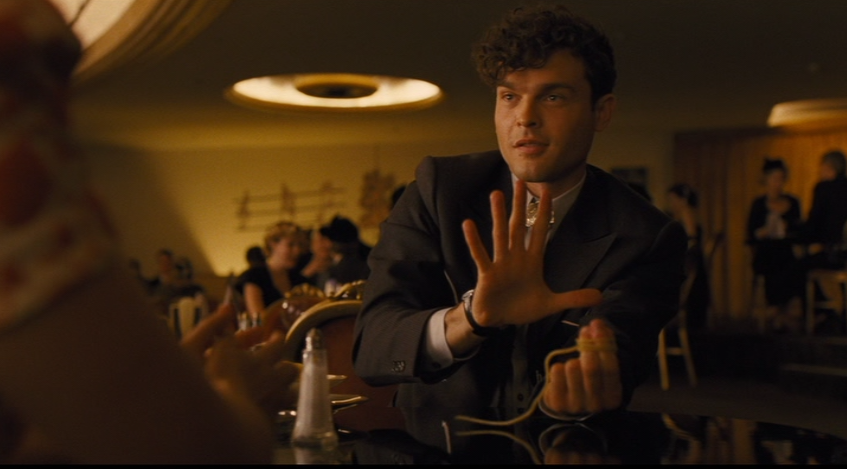
George Clooney telling a group of effete communists a pointless story about shaving Danny Kaye’s back is amazingly funny for all kinds of reasons. Frankly, George Clooney plays a feckless idiot better than just about anyone else in Hollywood.
That first rope tricks bit was one of my favorite gags in the whole film. He’s waiting, he has a minute or two to spare, so instead of reading a magazine or twiddling his thumbs or whatever, he pulls out a rope and offhandedly performs some expert rope tricks.
I’d forgotten about the jigsaw puzzle joke – hilarious, and very Coen brothers.